Get Inspired
My Legacy: Gary Fencik on the Future of Football
Chicago Bears legend Gary Fencik has always thought ahead. A wide receiver at Yale University, Fencik was drafted by the Miami Dolphins in 1976, but cut before the season due to injury. His hometown team, the Chicago Bears, called him for a tryout, and Fencik – who after being cut had already set in motion his backup plan of banking – made the team.
With the Bears, Fencik developed into an All-Pro defensive back, earning the nickname “Hit-Man” for his ferocious tackles and setting the Bears’ all-time record for interceptions during a 12-year, 164-game career. The epitome of a scholar-athlete, he enrolled in the Northwestern University MBA program in the offseason and graduated in 1985, the same year he won the Super Bowl.
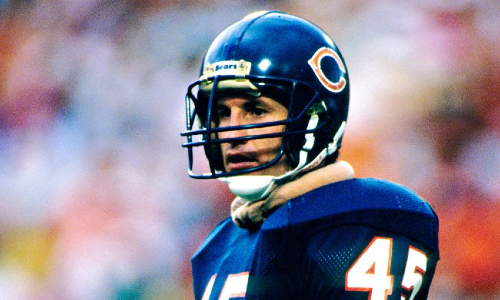
Posted: December 22, 2015
Now 61, Fencik still lives in Chicago and serves as a Partner and Head of Business Development at Adams Street Partners, a global private equity firm. True to his character, Fencik’s forward thinking has provided one more line for his resume: future brain donor. He has pledged his brain to the Concussion Legacy Foundation as part of the My Legacy campaign, to be studied for Chronic Traumatic Encephalopathy (CTE) after his death.
In this interview, Fencik spoke about his playing days, his thoughts on concussion and CTE awareness, and the legacy he hopes to leave by pledging his brain to research.
Why are you donating your brain to the Concussion Legacy Foundation?
If there is some contribution that I can make to the research that might lead to improving the chances that other athletes in the future don’t have a problem, I’m proud to do that.
Do you think the idea of brain donation is catching on among athletes?
I think there is still a lot of awareness that needs to be done. I don’t know how many players are really aware that they can make this contribution. Or you’ll wait until it’s too late, you pass away, and then no one knows that you wanted to make a contribution. So it’s something that I’ve given thought to. It reminds me a little bit of when we were playing and going on strike. When you’re in your twenties people are talking about how you need better retirement benefits, and you’re going, “what are retirement benefits? That’s something that’s going to happen to me way down the road.” I think it’s pretty easy just to delay that decision. Even though you might want to make a contribution, you say you’ll do it “someday.” I’ve just reached that point where “someday” is today.
What do you want your legacy to be?
I’ve been very fortunate to have a great life. To go to Yale, certainly you don’t think about the NFL when you go to an Ivy League school. So to have a great career, win a Super Bowl for my hometown team, I feel very fortunate. Playing football and just having a great experience with so many fantastic athletes, I’m very thankful for that. And I think as you progress into your career and toward retirement, you start to think more about making a contribution back. And I would hope this will be part of my legacy and my contribution back.
During your NFL career, did you have an eye on making sure you had a plan after your career?
I think the players of my era did not have the benefit of free agency, and so most of my teammates worked in the offseason, or went to get another degree. Bob Thomas, who was our kicker, is today a Supreme Court judge in the state of Illinois. Alan Page, a Hall of Famer for the Vikings who finished his career in Chicago, today is a Supreme Court judge in Minnesota. I had a teammate who became a dentist. You had to work, because the dollars weren’t sufficient where when you were done with your playing career, you’d be in a position to potentially not have to work the rest of your life. So things were quite different back then.
I also had the benefit of having almost a parallel life where I had my Yale buddies who were going to business school, law school, and med school, and recognizing that at some point when this career ended, that I was going to need another degree to pursue whatever I was going to do after football.
You are a prime example of a successful transition from the NFL to a post-league career. What has allowed you to make that transition so smoothly?
Well, I don’t know that I felt it went smoothly at the beginning. I think the difference is that when you’re in your twenties and everyone is switching jobs, it’s very natural to do so. But if you are fortunate enough to play until you’re 30 in the NFL and maybe you have a wife and a couple of kids, the idea of taking three to five years to transition and see what you want to do when you ‘grow up’ is a different path, and a very lonely one. I was fortunate that I did go to business school while I was playing, and while I had some idea of what I wanted to do, as I look back, it still was a difficult transition.
What do you miss the most about playing in the NFL?
You have a goal every week that you’re either going to be good enough, both personally and as a team, or you’re not. It’s that immediacy and that certainty that you are going to play at noon, and by four o’clock you’re going to know whether your team was good enough that day. You rarely see it in business outside of sports. Things get postponed, decisions get delayed, it’s just much different than the certainty of a decision in the NFL.
I think one of the other things I miss is just being paid to work out. [Laughs] Now, I might work out after I spend a full day or travel somewhere, whereas in the NFL, they’re paying you to work out and stay in the best shape of your life, and you’re just having fun.
What do you miss the least?
I don’t miss the injuries, I don’t miss the aches, and I don’t miss icing my knees after every practice. Every single practice from the time I was injured in about my fourth year to the time I retired eight years later, I had to pack my left knee with ice after every practice as the regimen of staying in shape. I certainly don’t miss that.
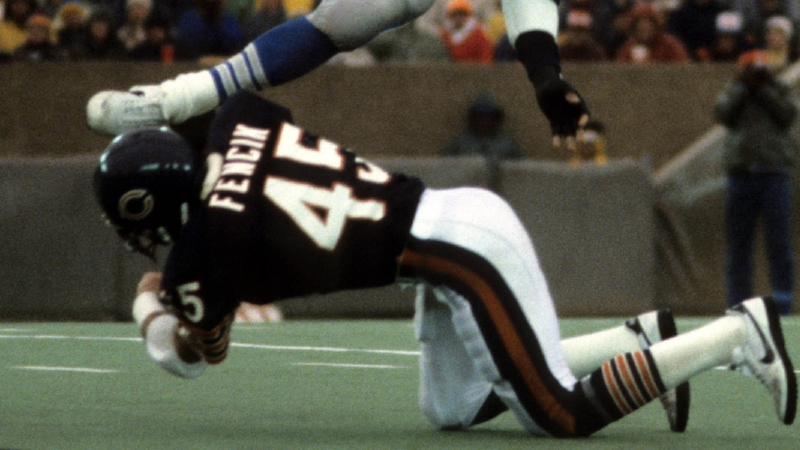
How would you describe your style of play?
I was a wide receiver at Yale, so the transition to defense was a challenge. I learned through watching other players on the team, and from Doug Plank in particular, who I played with for six years. He really helped me become more aggressive. I think that at some point, most players stop thinking and simply move to a different gear, and I was fortunate to get that opportunity to do so. I certainly was known as a pretty good hitter, but I would say that my success in the NFL was predicated on having a defensive coordinator in Buddy Ryan who put a high degree of importance on playing smart. So I definitely saw myself as being a smart football player.
The awareness of concussions and CTE right now is probably higher than it has ever been. Did you ever think about all those hits adding up while you were playing?
No. I never gave it any consideration at all. I only had one concussion where I had to leave the playing field. I hit [Hall of Fame running back] Earl Campbell, and it wasn’t even a particularly good hit, but I had a 33-inch waist and Campbell had a 34-inch thigh. I came back and finished that game, and I think I tackled him or tried to tackle him the last three plays of the game, and although I got credit for the tackles, I was on the bottom every time. But I didn’t have any repercussions after that game. I can’t really recall that I had headaches after the game. So I feel very fortunate today.
Do you think about the potential effects of head trauma a lot now that you have retired from the game?
Going forward, all of us are concerned not about the shoulders or the replaced knees. Everybody’s just worried whether or not there may be a time where you start to develop symptoms as a precursor to CTE. I would say that there was a clear demarcation line in my life where my teammate Dave Duerson died by suicide. After that, there was no hiding or being evasive about the potential impact that this could have on the quality of my and all of my teammates’ lives going forward.
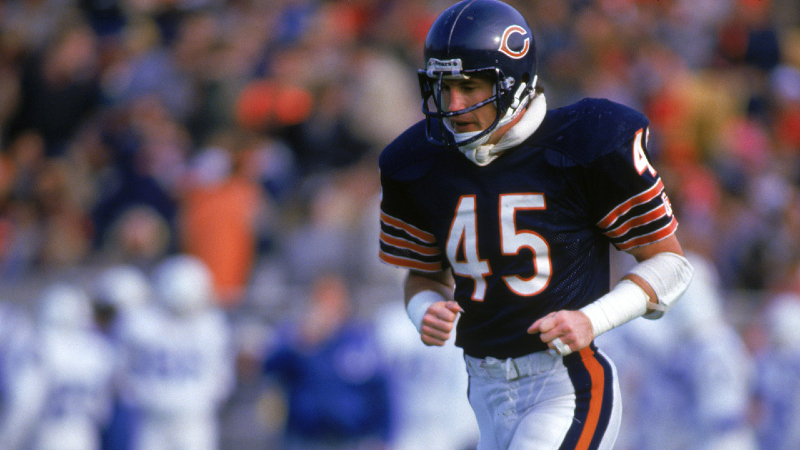
It struck me to see Mike Ditka say earlier this year that he wouldn’t let his hypothetical child play football. Your team, the Bears of the mid-1980’s, is one of the best NFL teams of all time, and these are football lifers who are now reconsidering the place of football in their lives. Is that a strange feeling?
I’ve talked to a lot of my teammates and a lot of people who I’ve played against and with, and I don’t know that anybody wouldn’t do it again. But my hope and expectation is that there’s going to be better protocol and better procedures to increase awareness. We’ve got to find the best way to modulate – you know you’re not going to eliminate them – but hopefully reduce the multiple concussions that could lead to significant problems in your adult life. And unfortunately, for some athletes it’s impacted them even sooner. And that’s really a tragedy.
Your daughter, now a college student and soccer player, has really dug into the issue of concussions. What has that been like for you?
It’s extraordinary to me that my daughter, who I thought was going to be an English major, is a neuroscience major now as a result of an internship with the Concussion Legacy Foundation. It completely changed her outlook in terms of what she wanted to focus on in college, and I’m very proud of what she’s doing. So I’m glad it had such a positive impact on her. I think the more people are educated in terms of concussions, they’re just going to make smarter decisions, whether it’s for themselves in sports, or for their children.
Does having kids of your own change your perspective on safety in sports?
When you talk about youth sports, I have a really high degree of confidence that people are getting smarter and technology is going to improve the ability to monitor these injuries. Instead of applauding and cheering pee-wee football players hitting one another, I think there are smarter ways to go about enjoying yourselves at a young age without having to put pads on. I don’t know anyone who, at the age of 8 or 9, said they aspire to play left guard. [Laughs] I coached flag football for my son and my daughter. I think with the fun of football, there’s so much you can do –– learn the rules and the importance of a huddle, and teammates, all of those things you can do without putting pads on.
To learn how to pledge your brain for research, click here.
You May Also Like
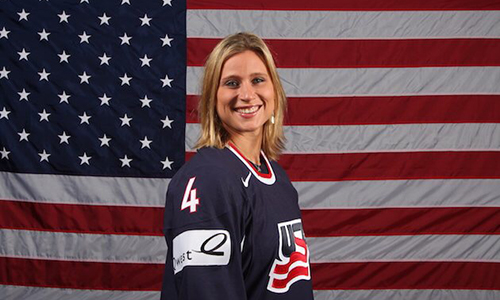
Hockey Hall of Famer and 4-time U.S. Olympian Angela Ruggiero wants to be an inspiration for female athletes to participate in concussion and CTE research.
Watch: Ruggiero on her legacy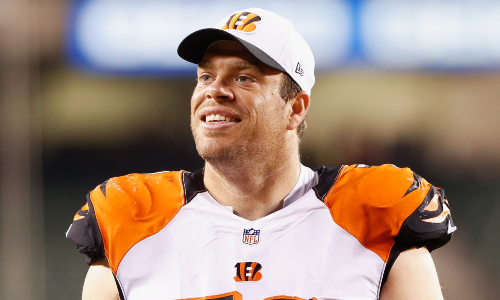
Former NFL player and NFLPA President Eric Winston took the #MyLegacyPledge to help the next generation of athletes.
Eric Winston on his legacy